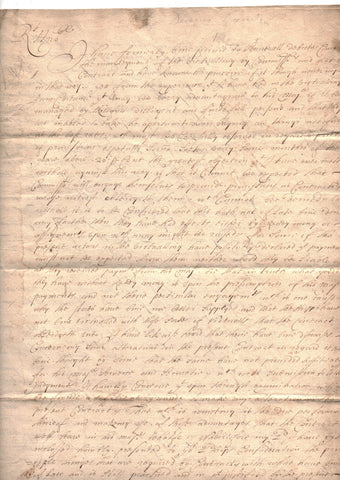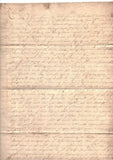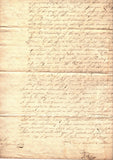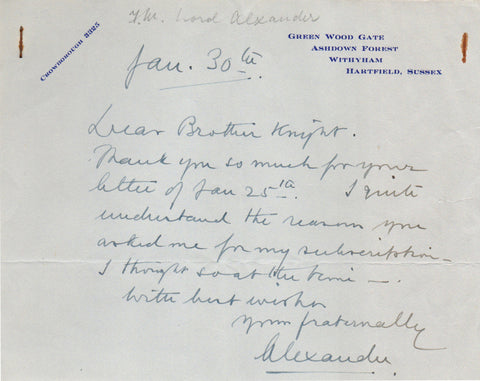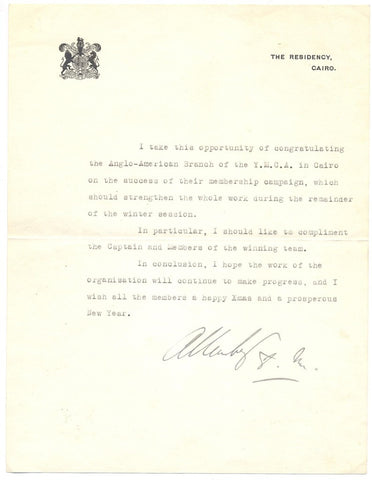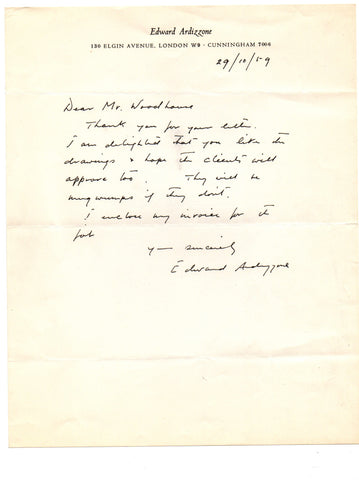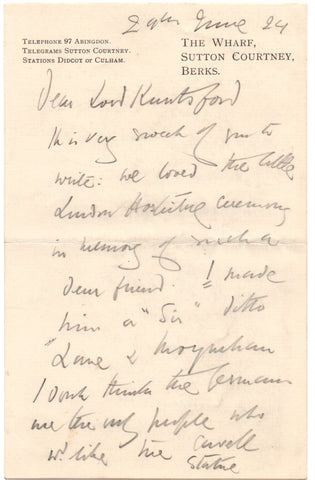GAUDEN Sir Denis - LS 1673 pointing out fraudulent practices in victualling the Navy
Sir Denis GAUDEN (c. 1600-1688)
Letter Signed (“D Gauden”) to the Lord High Treasurer, Viscount Latimer, giving his views, in some detail, about victualling for the Navy.2 pages folio with integral address leaf, n.p. [but London], 6 September 1673.
“I have formerly bine privie to several debates concerning the management of the Victualling by Commissors . . . not by contract and have knowne the practice of it though never imployed in that way yet from the experience I have had in the victualling I am certaine may bee very advantageous to his Maje[sty] if it be manadged by skillful diligent and faithfull persons and that they are inabled to take the opertunityes in buying all things needfull at the best rates w[hi]ch must be carefully observed in regard prices of provisions espetally some sortes vary some months of the yeare above 20p.cent: the greatest objection I have ever mett withal against his way is that it cannot be expected that Commiss[ion]ers will engage themselves to provide provisions as contractors whose interest obliges them w[hi]ch cannot be denied, but withal it is to be considered that this hath not of late bine done any farther than they have had effects either by ready money or assignem[en]ts upon w[hi]ch money might bee raised for some of the present actors in the victualling have positively declared that payment must not bee expected from them neither would they bee liable but as they received paym[en]t from his Maj[est]es soe that in truth what goods they have without ready money is upon the presumption of his Maj[est]es payments and not their particular engagem[en]ts w[hi]ch is one cause why the stores have bine noe better supplied and that the shipps have not bine victualled with those sorts of victuals that the contract obleigeth unto: I have likewise heard that theire have bine discources concerning some alterations in the present contract in regard it have bine thought by some that the same have not provided sufficiently for his Maj[es]tes Service and securetie w[ic]ch with submission to better judgments I humbly conceive that upon thorough examination will not be founde a sufficient grounde to make any alteration in the present contract. That w[hi]ch is wanting is the due performance theireof and makeing use of those advantages that the contract will beare in his Maj[est]ies behalf wheirefore my Ld I have by the inclossed humbly presented to yo[u]r LdShips consideration the principle things that are required by contracts with what have bine of late and is still practised and in pt. justified by the present actors theirein w[hi]ch if continued will be exceedingly prejudiciall to his maj[es]tes Service, and suject the same in a great measure to theire curtesie of w[hi]ch theire is noe necessitee for what ever hath bine pretended to the contrary both in respect of the difficultie of procuring cash and credit by other hands in a tyme of soe greate an action – I doe assure your L[or]dshipp that if his Maj[es]te please theire bee persons that are not inferior to those that now manage the affairs of the victualling that will undertake the same and will hould themselves strictly obliged to the termes of the contract in all things that may conduce to the securetie ease and advantage of his Maj[es]tes favor and justice that after soe many years experience of my Serveice with some approbation, I may bee continued therein before others that have bine but of late concerned, and by Fraudulent practices have brought matters in the victualling to that passe as they now are – yo[u]r L[or]dshipp was present when notwithstanding what ever was offered by the Lords in the Great Chamber. I could not think it reasonable to make it my act to desist from his Maj[es]tes Service nor never should espetially whilst I was then assured by all the Lords then present that his Maj[est]ie would not make it his. But as matters then stood I did propose a determination of the present contract the ende of december next hopeing theireby his Maj[est]ie would have a fitt opertunity to dispose of that affaire to sattisfaction and I then thought that I had done a very acceptable serveice and alsoe hoped that I might stand as faire to bee continued in his Maj[est]ies favor and that imployment as those gentlemen who weire but of late joined with mee, and who I may say without vanitie have not given that Testimony of the readines to comply with his Maj[est]ies Serveice as my selfe have done but my Lord I feare I have so much intrenched upon yo[u]r goodness and favor wheirefore humbly beg yo[u]r pardon with the continuance of yo[u[r favor.”
The length of this letter may seem to have occasional digressions, but the nub of the matter is surely the argument that Gauden has given loyal and honest service as a victualler to the Navy, whereas others “of late concerned . . . by Fraudulent practices have brought matters in the victualling to that passe as they are now” – a practice which, it seems, has never been entirely eradicated in suppliers to governments.
Sir Denis Gauden was well acquainted with Samuel Pepys; indeed, the “Selection” from Pepys’ diary lists forty-four separate entries of references to Gauden. They appear to have been on friendly terms, and in July of 1663 Pepys describes a visit to Gauden’s newly built house in Clapham, with which he was suitably impressed, “the house . . . very finely contrived, and the gardens . . . full of good variety.” Interestingly, he also notes that it was Gauden’s “good husbandry” that meant he spent less than people thought.
The same appears to have been true of Gauden’s work in supplying the “victuals” for the Navy, an argument he makes in this letter. Supplies for the Navy were a prime concern in 1673. Six years earlier, the English Navy suffered its most embarrassing defeat when the Dutch sailed up the Medway and burned or towed away the ships moored there. The Second Anglo-Dutch war was brought to a hasty end. By 1672, the fleet was rebuilt and the Third Anglo-Dutch war began, bringing with it a pressing need for supplies.
Sadly, Pepys’ diary does not extend to 1673, so we will never know what he thought of this situation, but it is clear from Gauden’s letter that some suppliers were less efficient (and quite possibly less honest) than others. Worse, payment from the Royal purse was not always forthcoming.
Gauden, who had been a very prosperous man, went bankrupt as a result of these unpaid bills and was forced to sell his house in Clapham, home to a particularly good library. It was bought by William Hewer, Pepys’s trusted clerk. Pepys, who had been a frequent guest of Gauden’s Clapham house, lived there for the last two years of his life, when it was owned by Hewer, and died there in 1703.
Delivery
Autographs can be delivered worldwide. Delivery costs are calculated at the time of order and items will be sent by the most appropriate means, depending on your location and the value of the item. This will usually be by Royal Mail Special Delivery within the UK and Royal Mail Tracked outside the UK.
The current delivery charges are:
-
UK:
Royal Mail Special Delivery £9.00
-
Europe:
Europe Royal Mail Tracked £15.00
EU customers should note that, following brexit, local VAT and customs duties may apply to their purchases.USA:
-
Royal Mail Tracked £25.00
Rest of the World:
-
Rest of the World Tracked £20.00
Export Licensing
Customers should be aware that all letters and documents over 50 years old require an export licence, which may delay delivery by anything from one to three weeks. Signed photographs are not subject to export licence regulations, and can be sent immediately.
There is no charge for the export licence and I will take care of the application, the only inconvenience to you will be the delay.
Authenticity
The authenticity of the letters and documents offered is guaranteed.
Payment
Online sales orders
Payments made via the website are processed by Shopify Inc and can be made using Visa, Mastercard or American Express.
Telephone sales orders
Items may be purchased by phone. Please contact me using the website Contact Form and I will call you within 48 hours to discuss your requirements. Payment for purchases ordered by phone can be paid upon receipt of the invoice and must be paid within 7 days. Phone orders can be paid by cheque (in pounds sterling only) or bank transfer.
Items will be reserved for one week following the order confirmation and will be dispatched either within 7 days after full payment has been received, or after any required export licenses have been granted.
Returns Policy
Should you be in any way dissatisfied with your purchase, items may be returned within six weeks of delivery and a full refund will be made upon receipt of the returned item. The item must be received by Richmond Autographs in the same condition as when dispatched. For full details, please read our Terms and Conditions.
We Also Recommend

